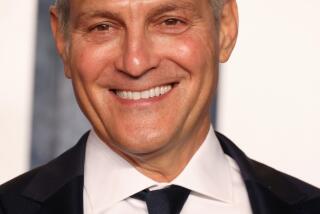Diller Bids Vivendi Adieu
- Share via
Entertainment mogul Barry Diller is exiting Hollywood -- at least for now.
Diller resigned Wednesday as chairman and chief executive of the U.S.-based movie, TV and theme park unit of French giant Vivendi Universal. He acknowledged that investors were “concerned and confused” about his dual role as head of Vivendi Universal Entertainment as well as USA Interactive, his sprawling electronic commerce company that includes the Home Shopping Network and Hotels.com.
Although the timing surprised Hollywood insiders, Diller’s decision was not entirely unexpected, because his position was always billed as a temporary job.
Still, the development marks a dramatic turn of events from six months ago, when there was widespread speculation that Diller would emerge as a pivotal player -- and possible buyer -- for Universal’s entertainment assets. That prospect grew increasingly unlikely as Diller confronted several factors, analysts and company executives say. Chief among them was increasing pressure from USA Interactive shareholders for him to focus exclusively on his electronic commerce holdings.
Diller also had a falling out with Vivendi Universal Chief Executive Jean-Rene Fourtou over how to unravel the complex relationship created last year when Diller sold his USA Networks to Paris-based Vivendi for $11 billion.
Additionally, Diller’s longtime investment partner, cable magnate John Malone, has shown waning interest in Universal’s assets as his company, Liberty Media Corp., has focused on other possible deals with players such as DirecTV.
“My executive role was never intended to be permanent,” Diller said in a statement. “Now that Vivendi Universal has begun a formal process in reviewing options for the entertainment assets, it is appropriate to step aside from any direct management responsibility.”
Fourtou, who is weighing the possible sale of the Universal entertainment assets to slash Vivendi’s hefty debts, said in a statement that he would take over Diller’s position. He thanked Diller for his “efficient, friendly support over the past few months.”
Fourtou and Universal Studios President Ron Meyer sought to calm employees anxious over the fate of their unit.
“We want to assure you that the transition will be smooth,” they wrote in an e-mail to personnel. “We also want to acknowledge how difficult it is to work in an uncertain environment, particularly in the face of constant rumors and speculation.”
In a conference call with USA Interactive investors, Diller stressed his desire to put the e-commerce company front and center.
That commitment was underscored Wednesday, some said, when USA said it would purchase the portion of online travel service Expedia Inc. that it doesn’t own in a stock swap valued at $3.3 billion.
The news sent the shares soaring $8.23 to $47.13 on Nasdaq.
“People have always feared his attention would be diverted,” said New York money manager Dennis Leibowitz, an investor in USA Interactive. “This is meant to reinforce the notion that everything is concentrated on USA Interactive.”
Others were similarly heartened that Diller seems to be making good on his assertions that his priority is electronic commerce, not Hollywood.
“I took him at his word when he said he wasn’t really interested in creating an enter- tainment empire,” said Larry Haverty, an analyst at State Street Research & Management Co.
If he hadn’t backed away from Universal, Haverty added, “I don’t think people like me would have looked favorably on that.”
Diller, however, was a bit cryptic in discussing possible plans for Universal. Some observers believe that Diller’s resignation could clear the way for him to make a bid for the entertainment properties. Diller said he had no such intention, but wouldn’t rule out the chance that, under the right circumstances, he could make an offer. “If someone calls us ... we’ll look at it,” he said during the conference call.
Meanwhile, Diller’s resignation also could strengthen the hand of billionaire Marvin Davis, who already has offered to buy a controlling stake in the Universal assets for $13 billion. Davis declined to comment.
Diller still will have some influence over the future of Universal because of blocking rights he holds on the sale of certain assets, such as the SciFi and USA channels. His deal allows USA Interactive to prevent Vivendi from selling entertainment assets for 15 years unless it pays $500 million to $1 billion to USA to cover tax bills that would come due with a sale.
Another restriction limits what Vivendi could do with the cash from any sale of the Universal assets. Vivendi would have to put half of the sale proceeds back into the entertainment division.
In addition to USA’s stake, Diller also has 1.5% ownership in the Universal entertainment properties. He also has a put option he can exercise that would force Vivendi to buy back his stake for at least $275 million.
Diller’s resignation is the latest chapter in a storied Hollywood career.
A UCLA dropout, Diller became a star at ABC and Paramount Pictures, and then founded the Fox network under Rupert Murdoch. After leaving Fox in 1992, Diller became involved with Malone’s QVC home-shopping network.
Diller later assembled an e-commerce and media empire of his own. Today, USA Interactive, pulls in revenue of more than $5 billion annually.
Diller’s deal with Vivendi in May signaled a dramatic return to Hollywood.
But his tenure at Universal was increasingly marked by clashes with the studio’s executives, who bristled at his acerbic style and focus on cost cutting, several studio sources said. Diller declined to be interviewed.
Meyer, however, said Diller “was a great contributor to our business and the studio.”
USA Interactive shares fell $1.64 to $24.85 on Nasdaq. Vivendi shares rose 56 cents to $15.36 on the New York Stock Exchange.
More to Read
The biggest entertainment stories
Get our big stories about Hollywood, film, television, music, arts, culture and more right in your inbox as soon as they publish.
You may occasionally receive promotional content from the Los Angeles Times.











